The excavation site across the street from the blueberry farm continues to fill with groundwater. It appears that the water table must be just a few inches below the level of the soil. (I think the pond shwon below is approximately two feet deep.)
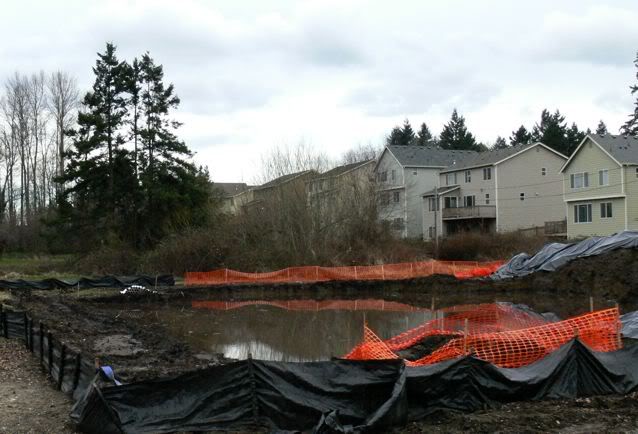
The excavation site across the street from the blueberry farm continues to fill with groundwater. It appears that the water table must be just a few inches below the level of the soil. (I think the pond shwon below is approximately two feet deep.)


I have to admit, I don’t really understand the motivation. If you have a 3.5 acre piece of property in an urban area, with willow trees, ponds, creeks, and acres of naturally watered blueberries….why would you want to give that up to put in one more home lot. A building lot in Renton is worth maybe $150,000, and there are potentially tens of thousands of them. The 3.5 acre U-Pick Blueberry farm, with it’s charming farm house, beautiful grounds, and loyal customer base is probably worth closer to a million dollars, and is entirely unique. (In order to build the new house, the property will have to be subdivided and a long private road will have to be built to reach the only dry upland section suitable for building.)
While I do not share the property owner’s enthusiasm for replacing a blueberry farm with one new home lot, I actually voted against this rezone because we do not have a good understanding of the underlying wetland. We had been told that the new R4 zoning will allow the blueberry farm wetlands to be protected, but I have several reasons to be concerned this may not happen. For instance, the property across the street from the blueberry farm is being legally excavated, and it is filling with ground water faster than it can be pumped out…leaving many wondering exactly when the wetland protections apply. And there appears to be risk of differing opinions as to whether a centuries-old peat bog qualifies for a wetland where it is not actually under water. City staff believe it is a wetland, but they are not legally qualified to make the determination…so we may have skirmishes over this issue in the future.
We also received a petition tonight, signed by 75 residents, asking us to get a wetland delineation before taking any action. I gave this weight in my decision.
In addition, the Washington Department of Fish and Wildlife wrote to council a few days ago, asking us not to rezone the property without a wetland delineation. Our city attorney says we don’t have to follow their suggestion, but I have seen this department demand attention elsewhere, such as when they added extensive fish mitigation to the billion dollar I-405 expansion project. And even if we can bully our way past Washington Fish and Wildlife, I don’t understand why we would burn bridges with this important department in an unpopular effort to turn a blueberry farm into a house, when we will need State Fish and Wildlife support for projects like our lake boardwalk trail in front of Boeing (the Sam Chastain Trail), toxic cleanup efforts at a polluted lakefront site, the rebuilding of Coulon park boardwalks and boat ramps, and on-going dredging of the Cedar River.
Finally, even with the R4 zoning, I am not sure if the required wetland buffers will even let one additional house be built. So if the property is sold, and the new buyer expects to subdivide, they could be very disappointed; they would likely be asking the question…why would council rezone property for four units to the acre if it won’t support anymore homes. A wetland delineation, prior to the rezone, would have eliminated this uncertainty.
We simply should have obtained more information on the wetland before proceeding.
Even though I voted against the rezone, it still passed. Not the first time (and probably not the last time) that I vote in the council minority. I hope the city is successful in providing good stewardship of the wetlands, and if possible, the blueberries.
The owner of the Kennydale Blueberry farm has applied for a rezone from RC to medium density R8, to allow additional homes to be built on the 3.5 acre site.
Council is considering allowing the property to instead be zoned to low density R4, which would allow one or two new homes, and would require that a biologist survey the wetland and put it into a protected status at the time of development.
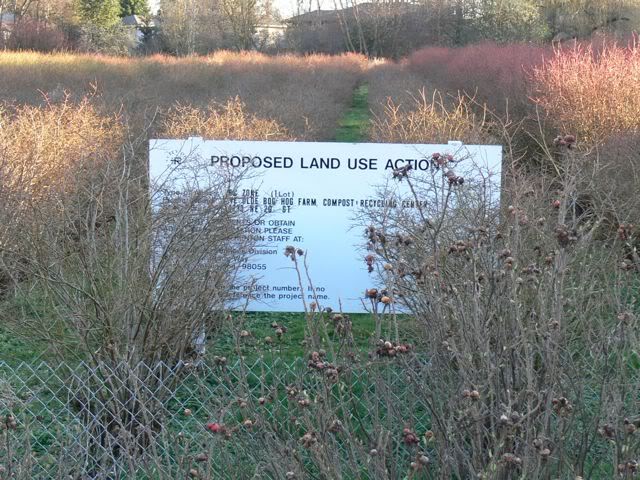
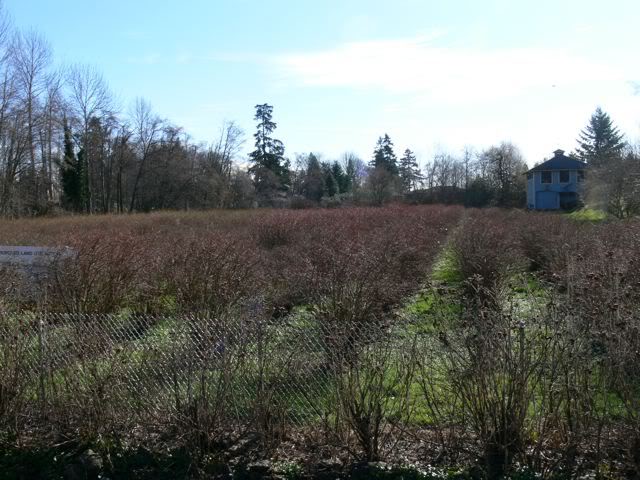
Many members of the public have expressed concern that waiting to survey the wetland until the development may be too late; they have specifically pointed to the site shown below, which is directly across the street from the blueberry farm. Some have speculated that the wetland peat bog may extend from the blueberry farm right under 20th street, to this site. ( I snapped the picture below last weekend)
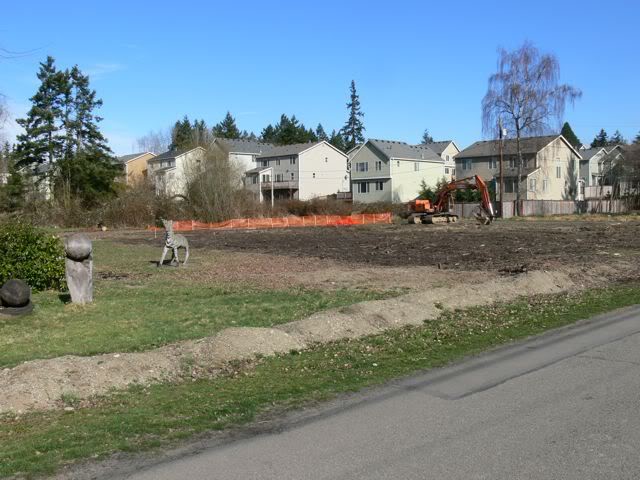
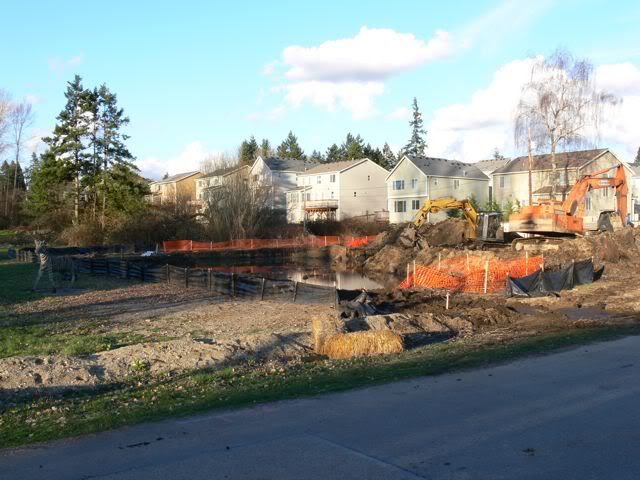
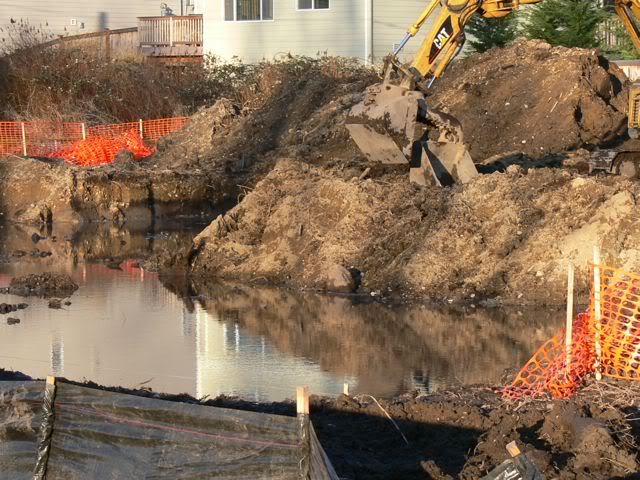

While R4 would require wetland protection, we’ve been told that RC zoning would not require wetland protection, and that dog kennel runs or horse paddocks could be built on the low lying areas.
Personally, I would like to see the 2.25 acre damp area remain a blueberry farm, regardless of whether an additional home is built on the uplands. We have many homes in Renton Highlands, but only one U-Pick Blueberry farm.

I love the simile Jerry Large uses in this column …”is the world driving itself while we pretend to steer, like kids in a carnival ride?”
Classic!
____________________________________________________________
Monday, February 19, 2007
Feeling powerless? You aren’t
By Jerry Large, Seattle Times staff columnist
A person could be forgiven for thinking life around here has gotten out of hand.
Neighborhoods change overnight, and big civic issues seem beyond the touch of average people. Big decisions about the viaduct, the Sonics, Iraq and development happen on a level most folks can’t reach. The paper seems full of anti-civics lessons.
Is the world driving itself while we pretend to steer, like kids on a carnival ride?
READ MORE »
I’ve recently been asked about Washington’s open public meetings act, and how it affects email. I have attached a great article about it from Washington’s Municipal Research Center.
Even though council email is a recognized public record, an exchange of emails from a majority of council members can actually constitute an illegal non-public meeting. It’s not wrong to send an email to all council members….but it is wrong for a majority of council members to respond back using their reply-to-all function. Furthering this risk, emails can also get appended and forwarded, from one council member to another, which can inadvertantly create a “meeting” via an email daisy chain.
I’m solidly within the spirit and letter of the law with this blog, as long as I don’t have a majority of council members replying to my articles. I like this blog format because it keeps my thoughts and discussion out there for all the public to see, without citizens having to trek down to city hall to read email. But, as I promised at the start of the year, the email I do recieve is available for everyone to see.
___________________________________________________
Here is the article:
Municipal Research & Services Center
Ramsey Ramerman, Attorney
Foster Pepper, PLLC
Communicating with today’s technology is faster and easier than ever. But this ease poses new pitfalls for officials subject to the Open Public Meetings Act, 42.30 RCW (“OPMA” or the “Act”). Unless proper safeguards are in place, the careless use of emails, instant message, chat rooms, electronic bulletin boards and other electronic communications can lead to the unintended and unknowing violation of the OPMA. Accordingly, public entities subject to the Act should have rules and procedures in place to ensure that unintended violations do not occur.
The OPMA requires that all “meetings” of a “governing body” be open to the public unless expressly exempt. RCW 42.30.030. Most multimember bodies of public agencies will be subject to the statute. RCW 42.30.020(1)(b). A meeting occurs when a majority of the government body meets to take “action.” RCW 42.30.020(4). The term “action” is expansive and includes not only the transaction of official business, but also simple discussion about official business, and the taking of testimony about official business. Accordingly, the OPMA will usually apply when a majority of any board, commission or council gathers for any official purpose.
Under the plain language of the statute, as well as opinions from the Supreme Court, the Act does not apply if less than a majority meet.1 The Attorney General and Supreme Court have also recognized that the Act does not apply, even when a majority gather, if no “official business” — business that could come before the governing body for a vote2 — is conducted.3 But the Act is not limited to in-person gatherings — a conference call could also amount to a meeting.4
Conceptually, emails land in a gray area. Like letters, emails create their own record that is subject to disclosure under the Public Records Act, so they will already be exposed by the sunshine laws. For example, the Virginia Supreme Court held that an email exchange is like an exchange of letters, already subject to public disclosure, but not amounting to a “meeting.” 5 Unlike letters, however, the exchange of emails can be nearly instantaneous, allowing for a practically real-time exchange. For other forms of communication, like chat rooms and instant message, the exchange is instantaneous, and no “record” is necessarily kept.
The Council needs to recieve details on the Sonics Arena proposal as soon as possible. Several of us on council have expressed our support of having the Sonics in town, but we are getting nervous about not getting formal information from the Mayor’s office, and not having a chance to discuss the options. When we ask questions, we get fierce lobbying instead, which is not what we need to develop a winning package. Meanwhile, today’s Times makes it sound as if Renton is being eyed for more than one-hundred million dollars, when council has in fact not approved any expenditures for this project. While we have a great site, and a beautiful proximity to new shops, restaurants, and parking at the Landing, and a council willing to work with the Sonics, we only have 58,000 residents….one-hundred million dollars is a lot of money for 58,000 people!
I would like to see the council get involved in the problem solving for this project, so that we can examine every possible way to make this successful. Pushing us out of the decision-making is not going to work.
__________________________________________________________________________________________
Here is an email I recieved from my colleague Denis Law on this topic on Friday.
Dear Colleagues,
I want to share some of my observations regarding the meeting the mayor convened
this morning regarding the Sonics. Please call me if you wish to discuss this so
that we don’t violate the Open Public Meetings Act. My intention is to just
inform you of what seems to be taking place from my point of view.
Those invited this morning were primarily business owners who would have a
predictable opinion on the value of having the Sonics locate in Renton. We did
have representation from the Kennydale Neighborhood Assoc., North Renton and
Highlands. There was no well-planned presentation and most of the the time was
devoted to asking the opinion of those in attendance as to whether or not there
is community benefit to have the Sonics in our community. The majority reaction
could have been predicted without attending the meeting.
What I see that is wrong with our process is that we’re asking local restaurant
owners or the chamber if there is a benefit of having the Sonics in our
community. Duh………………… of course there is benefit. What is
concerning to me is to have a restaurant owner call me after the meeting and
relay that he was asked by a member of the mayor’s staff what he thought about
the Sonics announcement. He replied that he thought it was great, and was then
urged to share his thoughts with the council since there are council members
clearly concerned about the Sonics coming to Renton.
I have heard some very legitimate questions raised by council members but have
not heard one word that we should not work with the Sonics to make this happen
if possible. Why would the administration spread the rumor that the council is
against the Sonics, or to try and influence community leaders to pick a side?
Our role is to understand what it will cost Renton residents in real dollars,
impacts and long-term debt to build a stadium in our community. We need to
determine if we can truly mitigate the impacts to neighboring communities and
also generate enough revenues to support the cost of city services needed to
support this facility while also repaying the bonded indebtedenss that we may
decide to incurr.
I have stated in emails to Jay and to Toni that I feel strongly that the council
needs to have the opportunity to weigh all of the information in order to make a
decision that is in the best interest of our citizens. I want to reiterate my
opinion that we should not spend any money on studies or consultants until the
council has had the opportunity to understand what will be expected of us, in
terms of financial support, and the proposed use of the facility in order to ask
questions regarding mitigating impacts to our neighborhoods. It’s my
understanding that Alex’s staff is prepared to move forward with hiring a
consultant without council approval or input.
It’s my opinion that the city council needs to be the driver of how we solicit
public input, time-frames and other aspects of this process. Right now, it
appears to me that we’re merely an inconvenient nuisance that needs to be dealt
with at some point in this process.
It’s my sincere hope that the city council will be the driver to all processes
involving the potential stadium being located in our community.
Thanks for listening!
Denis
—
Denis Law, Publisher
The Business Report
Renton Magazine
15 S. Grady Way, Suite 514
Renton, WA 98055
Time for another Blueberry Bog Blog 🙂

We had a lengthy and interesting discussion at Monday night’s council meeting concerning the Kennydale Blueberry Farm rezone. The owner of the decades-old 3.5 acre farm is ready for retirement, and desires to rezone the property to an R4 or R8 (four to eight units per acre), from its current RC (resource conservation). She also says that the Blueberry plants are dying as a result of the dramatic development all around her farm, and the de-watering of the farm’s natural basin thanks to the city’s new storm-water drainage system.
The city staff, the Planning Commission, and the council’s Planning and Development subcommittee have all recommended R4 zoning for the property, which allows up to four homes per acre on the dry, buildable portion of the property (estimated to be 1.25 acres). Much of the past citizen testimony, however, has been in favor of keeping the zoning at RC, which would not allow subdivision but would allow the existing home, one accessory home, and (as we learned on Monday) several other rural type uses including professional dog kennels, professional stables, and other rural businesses.
But it turns out that the RC zoning would not ever require that the owner delineate the most delicate feature of the property, the peat bog (fen) fed by underground springs, which appears to be thousands of years old and forms the headwaters for Kennydale Creek. In a worst case type scenario, it sounds like RC zoning would allow for a future owner to bulldoze the blueberry plants, and put kennel runs on this peat bog if they were so inclined.
R4 zoning would require wetland delineation, but not until the property owner applied for subdivision. At that time, the wetland peat bog (estimated at 2.25 acres) would be delineated and documented by biologists in a wetland report, marked as a nature zone, and protected against building or any active uses. The remaining dry upland property would accommodate one to three new homes, in addition to the existing home.
Several citizens expressed concern that if the wetland delineation is not done before rezoning, then the character of the property may be altered before the biologists have a chance to survey the wetland. So the council asked the Mayor and the administration to contact the property owners, and see if the city could obtain permission to perform the wetland delineation now, in order to know specifically what the impact of the rezone will be. The report could then be provided to the property owner, and she in turn could share it with potential buyers, to eliminate all unknowns about the wetland when the property changes hands. In addition, council asked the administration to explore whether the owner would be interested in selling the wetland section back to the city, to protect it in perpetuity. ( This is a very common action along creeks and other bodies of water.)
The council has agreed to take up this issue again at Committee of the Whole, in two weeks.
Jesse Tanner’s Memorial Service
Cathy, Andy and I attended Jesse Tanner’s memorial service today. The service was held in our church, St Mathews Lutheran, not far from our home. Kirby Unti (our loving, popular pastor who reminds us of Garrison Keillor) performed the service; he was assisted by two of Jesse’s grandchildren, our City Executive Jay Covington, and Renton’s Events Coordinator Sonya Maylander (who sang a beautiful solo -“How Great though Art”). The speakers all did a wonderful job of describing Jesse’s life, and sharing many memories. I was laughing and crying during the service, as I so often do when Kirby performs a celebration of someone’s life.
After the service, Cathy and I joined the police-escorted procession to Greenwood Cemetary, for the graveside memorial. There, in a light rain, Jesse was given a 21 gun salute by the Veterans of Foreign wars, as well as a flag ceremony by the police honor guard. Kirby also lead a prayer service.
Lastly, we attended a reception in the Spirit of Washington Pavillion Events center downtown, the building Jesse and I and others had worked so hard to save and remodel. The sunny, bright setting, with its 1930’s era bow-truss wooden ceilings and warm interior was a beautiful venue for Jesse’s reception. There was again lots of story sharing and celebrating of Jesse’s life. Along with Jess’s wonderful family and many friends, and many diginitaries from the city, I had a chance to see others I have not seen in a while. My old friend and campaign manger Dan Lynch, who also managed Jesse Tanner’s successful Mayoral election campaign, sat with us during the service. (Dan is actively raising his young family in Woodinville now, so we do not see him enough) Bob Edwards, my first council office partner, and current Seattle Port Commisioner sat with Cathy and I, and swapped home-schooling stories. We also enjoyed visiting with former mayor Don Custer, a funny charming man who sold us our duplex in Renton highlands. And Rob McKenna, State Attorney General, came down from Olympia to attend the service. And so many other friends…just too many to mention.
Janice Tanner was so kind and so brave, and my heart breaks for her–she loves her husband so much. Jesse’s grandson Brandon, who brought us all to tears during the service, was also fun to visit with….Jesse was so proud of Brandon when he ran with the Olympic torch some years ago, and Brandon had been one of Katie’s swim teachers.
We also met Jesse daughter Linda, a Texas resident who has become a successful author and sold a script to hollywood in a million dollar deal. Even though she and I had never met, she knew me by reputation, telling me how much I had meant to her dad. ( My eyes are tearing up as I write this).
Jess Tanner meant a lot to me and this city. I will miss him very much. He’s probably working on some economic expansion plan in Heaven right now, making it a better place for when we all see him again.
Thanks for all the memories Jesse…we love you.
Here is another summary of the Jet Center issue from my brilliant and hard-working colleague Marcie Palmer. Marcie has been working to gather input from the community on this issue. She also makes the important point that at Wednesday’s Transportation meeting we figured out that the Jet Center was called the preferred alternative only by a consultant, not by the council or the RAAC. Council and staff want more data before making a decision.
This issue is not decided, and all inputs are appreciated and accepted.
_______________________________________
Click here for Marci’s email (sent in response to Mark Hancock’s note):
Business Jet terminal, general aviation corporate aircraft center, executive pilot lounge, VIP passenger terminal, jet maintenance center….what are we talking about exactly?
The City Council’s Transportation Committee met yesterday, and it became clear to me that we still do not have a common understanding of what the controversial ‘Renton Jet Center’ actually is. Depending on who you talk to, it may be any one of the above items, or all five, or something else entirely.
I went into yesterday’s meeting thinking that the jet center was a place where corporations or well-heeled individuals would park their executive-class business jets. And I was thinking we were talking about jets with bathrooms, sleeping accommodations, and dining tables. As I said in my blog entry on January 28, I am sympathetic to public concern that such a facility could inadvertently become home to older, noisier jets such as Lear Jets–especially if the facility is privately owned.
I also heard the viewpoint that if the jet center were built right, it could attract the much-quieter very light jets (VLJs). But after some public feedback and review, this approach did not entirely make sense to me; VLJs are relatively small aircraft, not much different in dimensions than any other six seat aircraft. They could park in a multi-use general aviation hanger, and not need special operating accommodations from a dedicated jet center. In other words, someone who owns a six-seat twin turbo-prop would need a very similar facility to someone who owns a new VLJ.
When I asked my questions about this, I was told that I was mistaken about what the jet center is. But when others tried to set me straight, I found that other parties at the table (Renton Airport Manager, Airport Advisory Committee reps, Renton’s public works director, and some of my council colleagues) could not articulate a common understanding either.
In some views it is a transient pilot lounge and waiting area, where visiting pilots can park their airplanes, visit the area, and then take-off. In other views it sounds more like a VIP passenger terminal, where outbound VIP guests queue for travels far and wide. In some scenarios it caters mostly to jets, while in others it caters to all aviation uses equally.
And as an adjunct to the areas for accommodating people, there would be areas for storing or servicing aircraft –but it is not universally clear whether these are Renton-based aircraft vs. transient aircraft, or jets vs. mixed aircraft, or a combination of all these things.
After further discussion, it appears that the reason the stakeholders don’t agree on these answers is that the city was waiting to see what the private sector might propose. i.e The city would request proposals from the private sector, then let someone privately build and own the version of the “jet center, or corporate aviation center” we like best. (We would just lease them the land for thirty or forty years.)
But such an approach would be a mistake, in my view. I feel the City of Renton should develop the facilities ourselves, to our own specifications. We could sell bonds to build good quality and aesthetically appealing hangers, pilot facilities, and maintenance bays, and then pay for the bonds with monthly rental income—with no cost to taxpayers. We could size the hangers for general aviation aircraft, possibly including VLJs. We would then lease the space on an annual basis (instead of a 30-year basis), and have good control over the continuing performance of the tenants. For instance, if someone establishes a pattern of buzzing residents or demonstrating sloppy safety practices, we would evict them and take the next tenant on the waiting list.
This approach has another great advantage. When we allow the private sector to build on leased city property, we set up a future conflict and heartbreak for our children to deal with. When the lease period expires for public land under a privately owned building, taxpayer-equity laws require that the public take possession of the building. This can seem ruinously unfair to the owners of the buildings, who constructed and maintained the building for 30 years. (Clayton Scott, who we later named the airport after, actually lost ownership of his building under these circumstances).
Forced repossession after thirty years encourages the private sector to construct low-cost or temporary buildings, so they can financially tolerate abandoning them in 30 years. Unfortunately, such buildings can look like aluminum warehouses or even Kwansit huts. And in the waning years of a thirty year lease, some tenants even lose their will to keep their buildings painted—resulting in a bleak, neglected appearance so close to the heart of our downtown.
On the other hand, if the city builds the facilities, we can make sure they look nice, are built to last, and maintained properly. We can make sure we have courteous and safety-minded tenants, and we can provide space that accommodates the mix of airplanes that the Renton Community supports. This is the plan that I would favor.
___________________________________________________________________________
Important note:
The above opinion is my own, and I do not speak for the entire council. And I offer my apologies to those of you who have been working on proposals to build your own buildings on the subject airport property. I have not seen your proposals, and I don’t know who has made submittals. But I respect your willingness to invest in our community and regret the disappointment my opinion, or the fractured community reaction, may cause you. But I would not want you to invest even more in construction plans using incorrect assumptions about council or community support. I am only one of seven council members, so I don’t know how this question will resolve itself. If the City were to build a city facility, and lease space, it would seem fair to me that those of you who have submitted proposals would be at the front of the line for lease consideration. I’m not sure of the legal issues however, so I could not promise how this would work out.
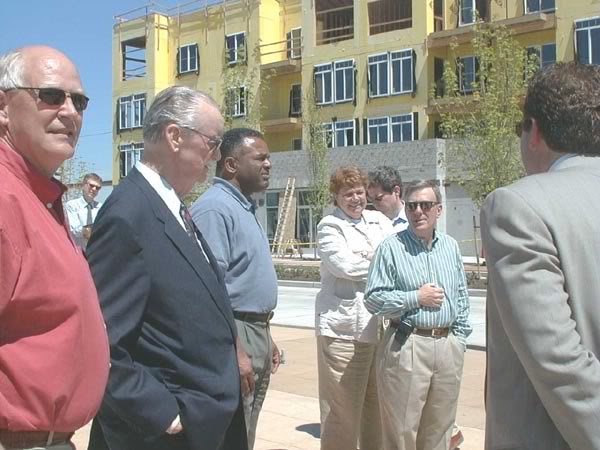
While Jesse was mayor, the city moved car dealerships out of downtown to the new auto-mall on Grady way, and then built the downtown piazza and pavilion events center to attract new condominium construction and residents downtown. Jesse personally pushed hard for the building of the new Henry Moses Aquatic center, as well as the downtown Veterans Memorial. He was mayor during construction of the IKEA Performing arts center (a joint venture with the community and school district), the downtown parking garage, the new city hall and police station, and two new fire stations. His advocacy and marketing of our city lead to Paul Allen purchasing the lakefront property which will soon be the Seahawks headquarters. Jesse started the city’s sidewalk replacement program, and the neighborhood grant program, both extremely popular to this day. His last major action as mayor, in 2003, was to put the development agreement in place with Boeing to set the stage for the Landing, where we all look forward to shopping next holiday season.
Jesse also cared about taxpayers and ratepayers. Jesse did not raise any of our utility rates for the first seven straight years he was mayor, and in his final year he only increased one rate, for sewers, by 3%. He constantly looked for ways to bring more shopping to Renton so that would could collect more sales tax, instead of property tax, to fund our improvments.
During the years Jesse was mayor, he and I made sure we met for lunch at a local restaurant at least once each month. During these lunches he would share with me all of the great plans he had for our city. He was a consummate problems solver, applying his experience in transporation engineering and executive management to the betterment of our city. He was also a dedicated family man, delighting in his wife Janice, his children, and his many grandchildren. I considered him a champion to our community, a great friend, and a trusted mentor. I will dearly miss him.
Good advice to us today, especially coming from the man who kept our nation intact…
“Discourage litigation. Persuade your neighbors to compromise whenever you can. Point out to them how the nominal winner is often a real loser – in fees, expenses, and waste of time. As a peacemaker the lawyer has a superior opportunity of being a good man. There will still be business enough.” The Collected Works of Abraham Lincoln edited by Roy P. Basler, Volume II, “Notes for a Law Lecture” (July 1, 1850), p. 81.
Hi, I’m Randy Corman. Welcome to my blog! I served on Renton City Council for 28 years, 1994-2021, with six years as Renton Council President. I’m also a mechanical engineer and manager, and worked for the Boeing Company for 33 years, from 1984- 2017. My wife and I have five kids and six grandkids, and we all live in Renton. I’ve kept this blog for 19 years, and get thousands of readers each month. Please share your feedback, ideas, and opinions in the comments.
Your comments are very appreciated and they add value to this blog. You may comment anonymously by leaving your name and email out of the comment form (there is no sign-in required). Please keep your comments civil and respectful; policy discussions are encouraged but avoid personal attacks. No threats of violence against anyone, or inciting violence in any form. No racist, sexist, or hateful comments of any kind. Be truthful. Do not make allegations of criminal, unethical, or other personal wrongdoing that you do not have proof to back up. Avoid profane, obscene, vulgar, lewd, discriminatory, or sexually-oriented language. Honest, respectful, good-faith discussion of public officials’ actions and their results are protected speech. Private persons deserve more discretion, so avoid any unfair criticism of them.
Admin login • EvoLve theme by Theme4Press • Powered by WordPress Renton Community Update
News from former Councilmember Randy Corman, your Renton City Hall insider. (All views expressed in journal entries are Randy Corman's personal views, and not the official position of the City of Renton or other city employees. Views expressed in reader comments are those of the commenter)

Recent Comments